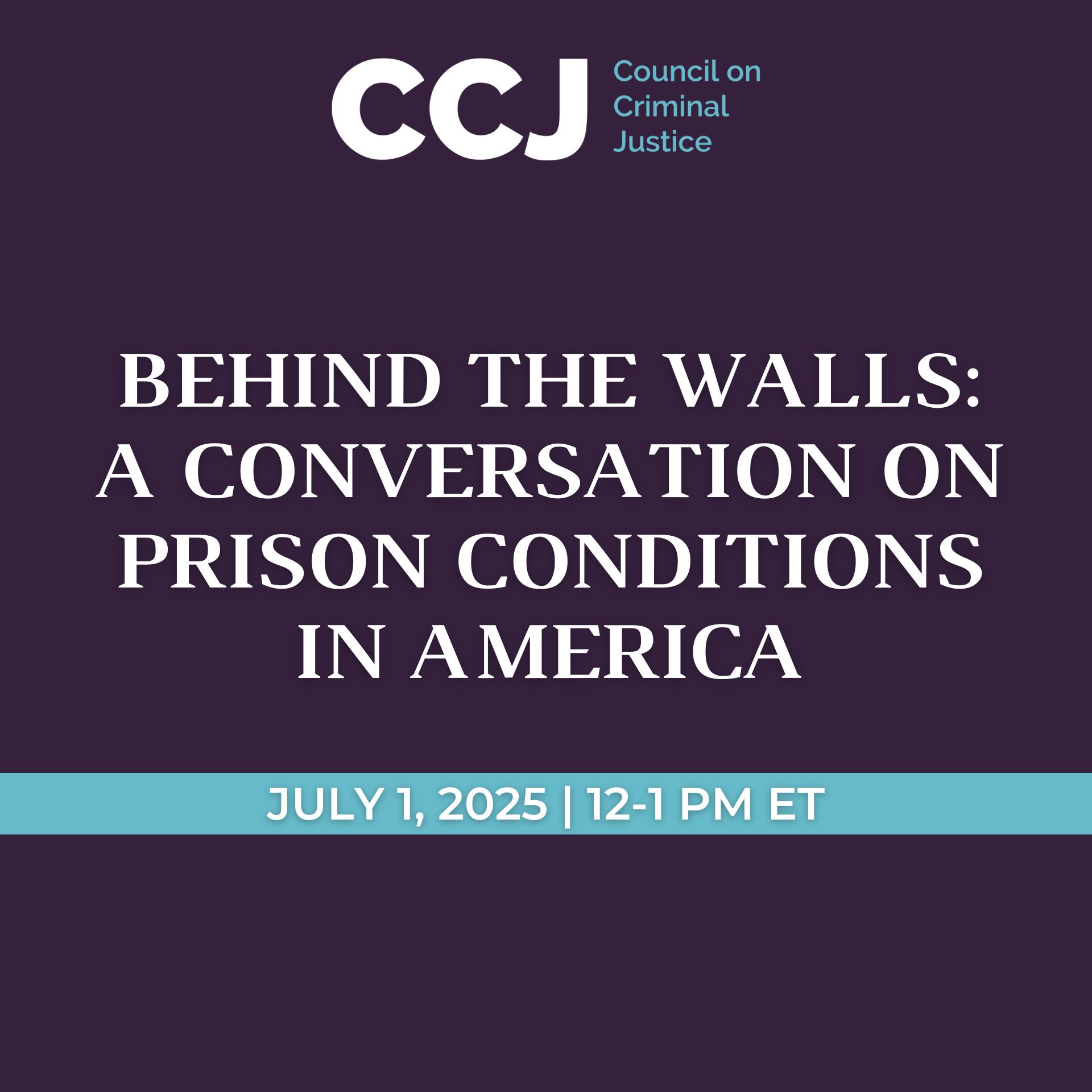Analysis for CCJ task force examined arrest histories of people who served an average of 19 years to evaluate public safety impact of shortening prison stays
FOR IMMEDIATE RELEASE
5:00 a.m. ET, January 12, 2023
Contact: Tania Stewart
tstewart@mrss.com
864-356-1320
WASHINGTON, D.C. – Shortening Illinois prison sentences of 10 years or more by modest amounts would result in very few additional arrests, cutting the state prison population significantly without jeopardizing public safety, according to a new analysis for a Council on Criminal Justice (CCJ) task force.
Reducing lengthy prison terms by as much as 30% would result in “a virtually undetectable increase” (less than one tenth of one percent) in annual arrests statewide, according to the report for CCJ’s Task Force on Long Sentences, which was produced in partnership with the Illinois Sentencing Policy Advisory Council (SPAC). Most additional arrests would be for drug, property, and other nonviolent crimes.
More than 1,100 people were released from Illinois prisons during the three-year study period, after serving a decade or more; the group served an average of nearly 19 years. While any additional arrests are cause for concern, the research estimates that reducing prison time served by those in the study group by one, two, or three years would result in between 11 and 37 additional arrests; in 2020, there were 89,173 total index crime and drug arrests in Illinois. No individual in the study group was estimated to have more than one additional arrest.
“Understanding the relationship between long sentences and public safety is critical for policymakers, and this research advances that understanding substantially,” said John Maki, director of the Task Force on Long Sentences. “It’s a powerful reminder of the diminishing returns of lengthy prison terms. Most people ‘age out’ of criminal behavior as they near the end of a long sentence, and shortening their time behind bars can be done with minimal impact on community safety.”
“This report adds important new data to the critical conversation around public safety in Illinois,” said Kathy Saltmarsh, executive director of the Illinois Sentencing Policy Advisory Council. “By providing policymakers with reliable estimates of how sentence adjustments impact public safety, its findings are a timely contribution to the state’s efforts understand the relationship between crime and punishment, to reduce violence and provide the resources needed to help every community thrive.”
The research was conducted by the data analytics firm Maxarth LLC, which analyzed detailed arrest history data for the 1,127 people released from Illinois prisons between June 2016 and June 2019. For those who had served 10 years or more, researchers then created “microsimulations” to estimate the number of arrests that were averted due to the individuals’ long prison stays. (Details on the calculations and analysis can be found in the report methodology.)
Reductions in the size of the prison population, the analysis found, would range from a 2.4% drop if prison terms were trimmed by 10% (or 1.9 years), to a 7.2% cut if sentences were shortened by 30% (or 5.7 years). Such reductions represent potential cost savings. A separate 2021 analysis by SPAC found that a 3,000-person reduction in the average daily prison population, along with a reduction in staffing, could represent nearly $148 million in annual state correctional appropriations. Saltmarsh said that while these reductions in and of themselves would not automatically produce cost savings for Illinois, they could lead legislators to make different choices about how to fund IDOC’s general operations.
“While results from similar analyses in other states may vary, our findings tell us that we can shorten long prison terms without creating a serious threat to public safety,” said the Maxarth CEO Avinash Bhati, PhD. “I hope this research sparks renewed dialogue about the role and effectiveness of long sentences across the country.”
The analysis released today follows a separate task force report in November that took a broader look at the complex relationship between long prison sentences and public safety. That brief synthesized the best available research on the issue, finding that:
- Long sentences prevent some crime from occurring through an incapacitation effect, although estimates of the magnitude of the crime-prevention effects are inconsistent and vary by crime type.
- Research findings on the specific deterrent effect of long prison sentences are mixed; the weight of the evidence indicates that long sentences have either no effect on recidivism or slightly increase recidivism when compared to shorter sentences.
- When compared to shorter prison sentences, longer sentences produce, at best, a modest general deterrent effect for violent offenses. Longer sentences may increase drug trafficking offenses and other crimes for which incarcerated people are quickly replaced by new recruits.
CCJ’s Task Force on Long Sentences is examining how prison sentences of 10 years or more affect incarcerated people and their families, victims and survivors of crime; correctional staff; communities; and public safety. Co-chaired by former U.S. Deputy Attorney General Sally Yates and former U.S. Rep. Trey Gowdy (South Carolina), the panel includes 14 other members representing a broad range of experience and perspectives, including crime victims and survivors, formerly incarcerated people, prosecutors, defense attorneys, law enforcement, courts, and corrections. The panel is expected to release recommendations for changes to policy and practice that can strengthen public safety and advance justice in March 2023.
Support for the Task Force comes from Arnold Ventures, the Ford Foundation, Southern Company Foundation, and Stand Together Trust, as well as #StartSmall, the John D. and Catherine T. MacArthur Foundation, and other CCJ general operating contributors.
About the Council on Criminal Justice
The Council on Criminal Justice (CCJ) is a nonpartisan invitational membership organization and think tank that advances understanding of the criminal justice policy challenges facing the nation and builds consensus for solutions based on facts, evidence, and fundamental principles of justice.
Other CCJ task forces have addressed federal criminal justice priorities, COVID-19 and criminal justice, policing, violence reduction, and Medicaid and reentry. A commission focusing on the extent and nature of military veterans’ involvement in the criminal justice system plans to issue a first round of recommendations in March.
To learn more, visit counciloncj.org.



